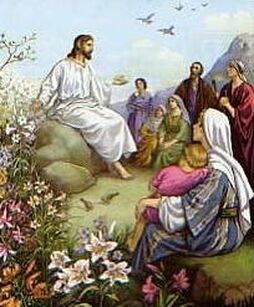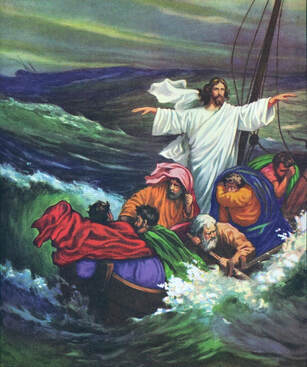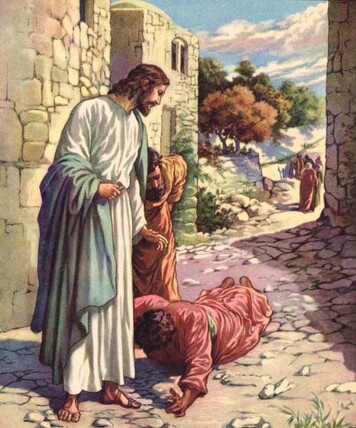
Second Point.-- Another part fell on the stony ground and, after springing up, was parched, because there was no moisture. " Two kinds of hearers are figured by this stony ground in which the good seed cannot take root. The first and the most pitiable are those who are voluntarily deaf- their hearts are hardened and have become as stone with regard to the word of God. We could scarcely believe it, if there was not the saddest experience to convince us. There are men who are determined to remain just as they are. They come to hear the word of God spoken with a fixed resolution of not profiting by it. Let them hear the most touching exhortations, let the most terrible truths be presented to them, even if the grace of a retreat or a mission is offered them, it is all useless. They hear nothing, they will profit by nothing; they are the minds of that character which the prophet indignantly depicts when he exclaims: "They have closed their ears, lest they should hear." What shall be the consequences of this studied and systematic resistance to the truth which is spoken exteriorly, and to the grace which urges and solicits interiorly? The very thought makes the heart grow cold. Our blessed Saviour exclaims: "Woe to you, Jerusalem, because if Tyre and Sidon had received the same graces as you have, they would have done penance in sackcloth and ashes. They shall be treated with less rigor than you." Yes, on the judgment day the infidel shall find an excuse in the misfortune of his birth, the heretic shall find an excuse in his ignorance, but you, reared in the bosom of the true Church, you, enlightened by so many lights and surrounded by so many graces,' what excuse shall you have ?
The second kind of hearers figured by the stony ground on which the precious seed falls is composed of all those Christians in whom certain passions have reached a state of habit. These form an almost insurmountable obstacle to the effects of the divine word. They hear it with pleasure, they admit the truth of all the reproaches hurled against them, and they would wish to be converted. Far from flying from the truth, they seek it. Should the preacher speak of the divine mercies, their hearts are touched; they make splendid promises-. Casting a glance on the disorders of their past life, their eyes are bathed in tears; but scarcely have they left the house of God than everything is forgotten. The old habits weigh them down, they succumb to the first flame of passion, the good germ is parched; the root is necessary if the good seed would develop. The second obstacle to the development of the word of God is a depraved will.
Third Point.—-The third obstacle to the effect of the sacred word comes from attachment to the things of the world, whatever may be the name by which you designate them. They are represented by the thorns in which the good seed falls. It grows there, it is true; the germ is developed, but it is stifled at its birth by the thorns which cover and clog the soil. This is the too common effect of pleasures and riches. Whoever possesses them finds much difficulty in extricating his heart from them, and the heart which is charmed by them affords very little access to the truths of salvation. It is true that the riches and pleasures of life are not criminal things in themselves, but the abuse which we make of them, and the affection we have for them, soon render them criminal.
Our divine Saviour compares the pleasures of the world to thorns, because they produce the same effect. If at first they spread on our pathway some agreeable flowers, soon they will embarrass us. Then they will make us feel their sharpened points, and in time they will wound us. See that young man, or that young woman, who has heard the divine word with docility and who has profited by it, who carefully cultivates the virtues which grace has germinated in her heart, but who, at the same time, cherishes a love for the world; because this love, which is moderate in the beginning, does not lead them into grave faults they imagine their virtue has received no wound; they think that in spite of the words of Christ they can serve two masters, and can continue to love the world without ceasing to love God. Fatal error; profane attachments grow and are strengthened, and in the same proportion religious inclinations are diminished and weakened. The evil is so great that it is not perceived. There is surely an increase on the one hand, and a decrease on the other. Because the same pious practices are continued, do we believe the same virtues are also continued? The exterior acts are the same, but the heart is already changed. After having lost the taste for pious exercises, there is no delay in losing the use of them also. We easily omit what has been done without inclination and by constraint; moreover, we are skilful to find pretexts for shortening certain practices and omitting others; this remissness insensibly leads to sloth, and the interval from sloth to sin is very short. See how worldly attachments lead us, little by little, when they are not early uprooted.
O my God, to what can I attribute the little fruit I have hitherto drawn from so many instructions, unless to my bad dispositions? Have pity on me, Lord; change my heart. Give me a new one, in which Thy word shall remain, take root, and produce those fruits of salvation which Thou hast a right to expect from me.
Source: Short Instructions for Every Sunday of the Year and the Principal Feasts, Imprimatur 1897






 RSS Feed
RSS Feed